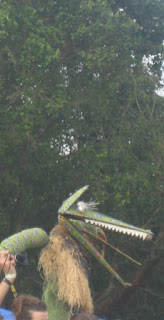Disclaimer: the
content of this website is mine alone and does not necessarily reflect the
views of the U.S. government, the Peace Corps, or the South African Government.
The heat is upon us!
One of my favorite things about living in my village is that I have
known the words for “too hot” (ka-hisa ngopfu) and “cold” (ka-titimela) pretty
much since my arrival. The similarities
to the story of Goldilocks and the Three Bears has been a source of amusement
for me, but I agree wholeheartedly with my neighbors…ka-hisa ngopfu! I do my best to drink enough water, but
sometimes it feels like I am chasing adequate hydration like a hamster on a
wheel.
Things were pretty busy for me through August and much of
September. I implemented Zazi for a
second time at the secondary school for grades eight and nine. I asked three girls from grades ten and
eleven to assist me as student leaders, and in exchange I would write letters
outlining the work they had done so that they could include them with their
applications to schools or jobs. The
leaders were so fantastic at classroom management and at explaining things in Shangaan
for my learners when we detected confusion.
Overall the intervention was successful, especially since the student
leaders are likely to be able to help with future interventions, but many of
the girls failed to attend on the two most important days: teenage pregnancy
and HIV/STIs. I was disappointed by the
low attendance for those sessions, but was happy that at least some of the
girls were there to hear the message.
The worst part of the low attendance was that I had purchased over 50
bananas in town for condom demonstrations and dragged them back with me (50 bananas
are extremely heavy) and only 10 girls showed up that day. I sent the girls home with the extra bananas
because there was no way I could finish them before they went bad.
I began teaching the caregivers at the Home Based Care on Friday
mornings each week. We used the manuals
developed by the Aurum Institute in Johannesburg for layworkers on HIV and TB, doing a chapter each week. I would then offer a lesson on an issue
pertinent to their clients, based on their reports. For example, I offered a side-by-side
comparison of hypertension and diabetes, and when the heat hit suddenly I
offered a lesson on dehydration, emphasizing the importance of watching the
elderly people and young children for the signs and symptoms of
dehydration. The caregivers were really
annoyed with me when I told them that water intake should be increased and soft
drink (aka cold drink) consumption should be decreased. Many of the caregivers were completely
annoyed by my lessons and some asked me why I was not paying them a stipend to
learn the material, but there were a few who would ask me questions and I would
see a notebook full of notes and perfect copies of the pictures I had drawn to
accompany the lessons. I think this
experience is a pretty good analogy for my service: often surrounded by
frustrations, but then there will be that one shining moment when I am so happy that I am doing what I do.
Of course my favorite thing about my service has far and
away been my work at the drop-in center.
The Explorers Club is ongoing, but lately the financial manager told me
she wanted to teach the lessons. She
takes the lessons very seriously, and even kicks me out with the younger kids
if I try to give the learners hints for answers to questions she asks. Her desire to teach has made me so happy, as
I hope this means that the program will be sustainable after I leave. The creativity days are still a huge hit, and
I absolutely love coloring with the kids.
It is great to see them grow more and more confident and independent
through such a simple intervention. If
you follow my Instagram you may have seen a recent video I posted of the boys
dancing while holding an unattached piece of playground equipment quite
precariously (I usually have about five near heart attacks a week with
them). The spontaneous dance party came
after I told them we would have a movie day.
We watched the cartoon version of Disney’s The Jungle Book. I was laughing harder at the strange parts of
the movie that had them giggling. They
were especially amused by Ka, the snake, which I found so strange as I always
thought Baloo was so much funnier.
It has been a busy, but satisfying term. My mother will be arriving next week for a
visit, so I will enjoy traveling around South Africa for a bit with her. We will spend four days in the middle of her
trip in my village so that I can do a Grassroot Soccer Camp with the kids. She will depart and I will return to my
village just in time to teach the kids at the drop-in center about American
Halloween. I am excited to help them
decorate masks, teach them the trick-or-treat rhyme and pass out candy, and to
show them the movie Hocus Pocus. It
should be a very fun cultural exchange!
































